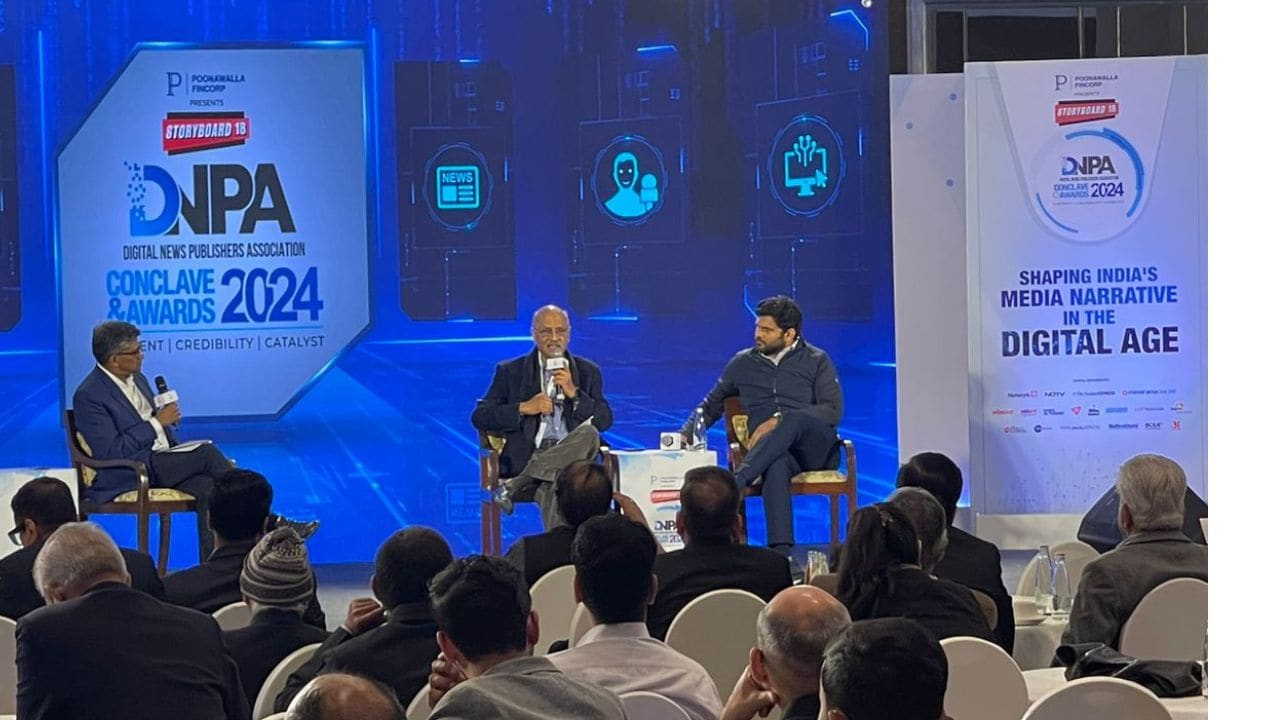The future of digital media in a time of AI-led transformation and the relationship between news publishers and Big Tech platforms was up for deep discussions as luminaries, policymakers, and stakeholders assembled at the DNPA Conclave and Awards 2024 in New Delhi, on February 6.
Digital News Publishers Association of India (DNPA) is the apex industry body of the digital arms of India’s top 18 new publishers from print and electronic media. Recognised for its role to promote credible news and safeguarding the cause of growth of the news industry, the conclave was organised by DNPA in association with Storyboard18.
The DNPA conclave also comes at a time when India is on the cusp of rolling out a Digital India Act to help policymakers create a more level-playing field in the digital space and safeguard sustainable models and growth.
The discussion on “State of Media – The Big Picture” included Anant Goenka, Executive Director, Indian Express, Senthil Chengalvarayan, Executive Director, NDTV and Shekhar Gupta , Founder and Editor –in-chief, The Print.
Shekhar Gupta, Founder and Editor–in-chief said, “Lots of people who might think what they have right now for their brand product or business house are going to be there forever; that’s going to change. Who had imagined, there will be a TV18 group or NDTV group when we started? A lot of these like the Dainik Bhaksar have come up in last 35 years, many have faded away. A lot of papers like the National Herald disappeared. Institutions and products will come and go.
He added, “To think that everybody will decline is ridiculous. Media is a small business. It is natural to be insecure about being in a small business. Biggest news company is India is less than Rs 7-8000 crore turn over, it’s good to be cautious but sometimes you get too cautious.”
Goenka said, “I think the survivors are going to be those who are investing continuously both on technology and content at the same time. You can’t be doing only content or only tech. All the digital first world companies all over the country have disappeared; Vox Media is undergoing bankruptcy, Vice is now in bankruptcy. Vice was more content, less technology. An organisation has to invest in both and that is very hard to both; it means investing a lot of money, especially in India our businesses are quite small. In that scenario, very few of us can invest in both. A lot of us in the news industry will struggle and wither away. I don’t see consolidation happening. There are 1,48,000 registered newspapers; I can’t imagine more than 50-100 having a survivable business model.”
He added, “Whether it’s legislation or without legislation, the fact is that I have seen Google making genuine efforts to reach out. If Facebook’s platforms didn’t have news their engagement can never be what they are. Google and Facebook won’t know about their consumer without news, Evolved big tech will understand that it is in their interest to keep news alive. It is not good for any innovative company to have a society without journalism; it’s fundamental to how they exist.”
Goenka pointed out that Apple has been trying and failing to get credible news since years. The fact that Apple couldn’t get it right all these years shows journalism is hard.
Gupta said, “Facebook didn’t give up on news because they found news toxic, they made news toxic, there was a pushback because of this in so many countries. Facebook didn’t respect news. Platforms need news because news gives them credibility. It needs news for credibility, to be taken seriously. These platforms can spend any amount of money, hire the most expensive journalists, but they cannot create credibility. News media has to negotiate much better with platforms.
Addressing influencer generated content, Goenka said, ” I can’t ask what Beer Biceps asks. I don’t see influencers as personalities. Their shelf life is limited.”
Shekhar too reiterated Goenka’s views and said that he stands against citizen journalism. He said, “The influencer/Youtuber who claims to be a journalist is approached by politicians and corporates who want to give their detailed interviews. These influencers, 9 out of 10 times, don’t know what to ask and thus they are told stunning lies.”
